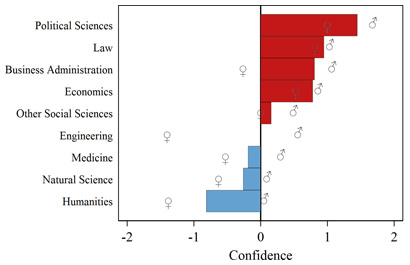A couple of researchers in Switzerland wanted to judge how confident students in different career paths were. First, they split them into groups of 12 and gave each a short test:
- In which year was the Nobel Prize in physics awarded to Albert Einstein?
- In which year was pope John Paul I (the direct predecessor of John Paul II) elected Pope?
- In which year did the reactor accident happen in Chernobyl?
- In which year was Elvis Presley born?
- In which year did the first flight with the supersonic jet Concorde take place?
The answers are 1921, 1978, 1986, 1935, and 1976. My guesses were 1920, 1979, 1986, 1940,1 and 1973, so I was off by a total of 10 years. How do I think this compared with the rest of my group? I’m going to say I was third best. If it  turns out that I was, in fact, only fifth best, I was overconfident by two ranks.
turns out that I was, in fact, only fifth best, I was overconfident by two ranks.
So how did everyone do? The first answer is simple: as you’d expect, men were vastly overconfident in their results and women were vastly underconfident. The chart on the right shows the second answer: political scientists were way overconfident and humanities students were way underconfident. Buck up, history majors! You know more than the budding politicians even if they’re oh-so-sure they know everything.
Bottom line: Science™ says that men in politics are blowhards. Ignore them. Women with English degrees know more than they think. Listen to them. That is all.
1This means that Elvis was drafted into the army at age 23. Doesn’t that seem a little late?

















